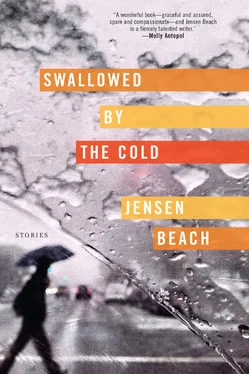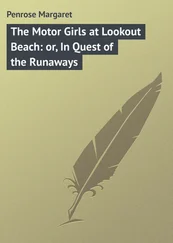Bent would die soon. He looked at his grandfather and thought this, very clearly, without emotion. The oncologist Bent visited last month had suggested Bent not choose to undergo chemotherapy. He’d been firm with his recommendation. Bent was old, the doctor explained to Lennart, and his body would probably not withstand the treatment. Lennart understood the doctor’s position. It was one Bent agreed with in the taxi on the way home from the clinic, but still the idea of doing nothing bothered Lennart. Given the capabilities of modern medicine, why shouldn’t Bent be kept alive as long as possible? But now, in the bar, drunk, he was struck by how simple the answer was.
“I don’t think it was anything like that,” Bent said. “It was slower. That winter was the longest winter I remember.”
Lennart wasn’t resistant to the idea of his grandfather being allowed to die because he wanted his grandfather to continue to live. Bent’s death would come soon, Lennart knew that. But he hoped that his relationship with Marie would end before Bent died. It was a simple thing for him to understand and he was surprised it hadn’t occurred to him before.
“I remember that cold gave us all sores on our legs,” Bent said, and slowly reached a large knuckled hand up and down his thigh. “Can you imagine the pain?”
Lennart leaned toward his grandfather and spoke clearly but quietly so that Bent would be able to understand him but probably not hear what he said. “I’m going to end things with Marie, Grandpa.”
Bent looked small in his chair. Lennart waited for a response from his grandfather, though he knew there wouldn’t be one.
Shortly before eleven, he called a taxi.
Outside, the snow had picked up and a fresh layer coated the rolled-up red carpet. The taxi was waiting for them. Lennart didn’t request a particular route home. He watched the headlights of passing cars. He leaned his head against the headrest and closed his eyes. They passed the Opera House. The building had been wrapped in a mesh wrap to cover renovation work that was being done. On the wrap was printed an old image of the Opera House. The wrap had been meticulously lined up with the building underneath, leaving only the peaks of the green copper roof that crowned the Opera House visible. He’d read about the renovations in the paper. The image depicted the Opera House as it was in the late nineteenth century. Horses and carriages filled the plaza. People posed on the steps. The scale was too big, the people and all the objects unbelievably tall.
The snow was falling heavily, veined in all directions at once in the headlights of the taxi. The driver turned to Lennart. “I’ll get you both home. Don’t worry.” They traveled slowly, but soon the taxi was turning onto Bent’s street. The incline of the street rose sharply at the intersection. The plows wouldn’t be out until the storm weakened. Snow fell hard from the orange clouds onto their shoulders as they shuffled from the curb to the building.
Upstairs, Lennart went from room to room, turning on lights. He set the thermostat. He helped his grandfather undress and get into pajamas. They drank another beer together at the kitchen table. It was probably just exhaustion but Lennart was drunk. He could pinpoint the feeling in his chest, a sleepy feeling that suggested both hope and fright.
Bent finished his beer and Lennart asked if he wanted another. “No,” Bent said, placing his hand over his glass. “That film wasn’t very good.”
Lennart was surprised by his grandfather’s lucidity, and looked closely at him as if to confirm that he’d heard correctly. “I guess not,” he said.
“It was too fast,” said Bent, placing his hands on the table in front of him and shaking his head. “It wasn’t like that, everything speeded up. Just the opposite.”
“No,” Lennart said. “I suppose not.” At one o’clock, he helped his grandfather into bed. When that was done, he typed a text message to Marie, though it was late and he hoped he wouldn’t wake her. “Finished now,” he wrote, just drunk enough to send the text without considering the double meaning. He was surprised when he got a response. “How was it?”
“It was fun,” he typed. Then he deleted that and tried to think of a clever word for inauthentic, for fake, one he wouldn’t have to explain to her in any great detail, but he couldn’t focus and simply wrote, “Had a good time. See you tomorrow.”
By four, the storm had passed. He went out on the balcony, the icy snow crunching under his feet. Below on the street, a siren, car horns, the horse-breath exhale of bus hydraulics. The sun crept upward and Lennart watched the city change colors.
Louise knew someone had moved in by the new name on the call box. She’d seen lights and movement in the apartment, which was across the courtyard from her and Martin, for the past few days. The new name confirmed it. Someone had finally bought the place. The name had been typed onto a small green piece of paper and taped to the call box beside the apartment’s number. She’d known a man with the name Jahani at school. Arman had been a doctoral student in French the year she’d started at Stockholm University. He’d taught the conversation tutorial she took fall term. She looked at the green paper again. All that was so long ago. He was the second man she’d ever slept with. Martin still didn’t know about it. She checked her watch. She was on her way out to meet her son Jonas for lunch. The metro she wanted to take was due in ten minutes. Arman had come from Iran to study, or maybe he’d come to escape the revolution. She couldn’t recall the details now. The years fell into one another. A bus rushed past on the street and the blast of warm air stung her neck.
Jonas wanted to try a sushi restaurant he’d heard about. They took a table on the patio. It was September but very warm out. She let him order. Arman had died in the early ‘90s. He was a professor of French at the university by then and his death had been noted briefly in the culture section of DN. One of his books about French cognates had caused a minor controversy. She remembered it well. His obituary mentioned two children, a daughter and a son. Maybe one of them had moved into her building.
“News from home,” she said after the waitress had brought their drinks, water for Jonas, white wine for Louise. Jonas hadn’t lived with Louise and Martin for more than a decade, but she still thought of the apartment as his home. “The apartment across the courtyard finally sold.”
“The neighbor who died?” he said. “Dad mentioned it.” Martin served on the co-op board and would have known about the sale. He rarely shared such information with Louise.
“That’s right,” she said. “Barbro Ekman. Her children had been trying to sell the place for months. You can’t imagine the smell when the body was first discovered.” The apartment, which was one floor lower than her and Martin’s, had been empty since Barbro Ekman died before Christmas the previous year. Her body was found only after Martin, who’d been up in the attic storage area on that side of the building to retrieve a box of decorations, smelled the decomposition. The air was sour and rotten, even two floors up. He’d been upset, Louise remembered, that no one in the building had noticed for so long, that no one who lived closer to Barbro Ekman had been alarmed by the overwhelming stench of her rotting body. “They’re all so selfish,” he’d said. But Louise suspected he was really only upset that he’d been the one to make the discovery.
Jonas took a drink of his water. “Gruesome,” he said.
It had been snowing the day the cleaning company came. She watched from her kitchen as they worked. They scrubbed walls and floors, removed furniture. They even took some of the fixtures and appliances from the kitchen. The idea that humans are so unclean on the inside preoccupied Louise for weeks. “Well,” she told her son, “I can’t imagine what a relief it must be to her family.”
Читать дальше











